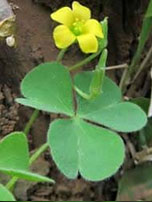SHAHEED KARTAR SINGH SARABHA AYURVEDIC MEDICAL COLLEGE & HOSPITAL
Affiliated to Guru Ravidas Ayurved University, Hoshiarpur Punjab
Affiliated to Guru Ravidas Ayurved University, Hoshiarpur Punjab

Botanical Name : Oxalis corniculata linn
Family : Oxalidaceae
Introduction :
The plant oxalis corniculata Linn belongs to the Oxaledaceae family. Because of its amlarasa the plant is known by the name changeri because of this it acts as rochana.As per some author marselia minuta is the original changeri since chatushpathri is the common synonym used by all the acharayas.Leaves of marsdia minuta are quadrifoleate and maybe it is the real source of chatushpathri but not axalis corniculatas.
Changeri is described in the brihathrayi among the vegetable category . but it is found to be extensively used and included in the amlavargadravya’s of Rasashastra charaka and susrutha have high lighted its utility in grahani and arshas.
Names in different Indian languages:
English : Indian sorrel, yellow oxalis
Hindi : Thenapathiya
Kannada : Pullampurachi
Malayalam : Puliyarila
Tamil : Puliyarai
Telugu : Pulichit
Bengali : Amrul , Amasalasaka, amatute
Punjabi : Khattibutti
Marathi : Ambutti , Ambotti
Synonyms:
Amlapathirka, Chathush chatha, Dhantashada, Ambashataka, Kshudra, Chaturparni, Chukra, Lona, Amlakonic, Sunishannachadha, Rajamota, Mota, Amladholica, Lonika, Lola, Chukrika, Ashmantaks, Shaphari, Kushali
Morphology:
Prostrate herbs with creeping stem, rooting at lower nodes. Leaves digitately 3-foliolate; leaflets 0.5-1.5 x 0.6-2 cm, broadly obcordate, base cuneate, apex emarginate; petioles 1.5-3 cm long. Flowers yellow, solitary or in axillary umbels; peduncles 4-10 cm long; pedicels 0.5-1 cm long; bracts 2, 3-4 mm long, linear-lanceolate. Sepals 5, 2-3 mm long, ovate-lanceolate. Petals 5, 5-6 x 3-4 mm, ovate-lanceolate. Stamens 10, in two rows. Ovary 5-celled; ovules many; styles 5, distinct. Capsules 0.8-1.5 x 0.3-0.5 cm, linear, puberulous outside. Seeds many, minute, brown.
Properties:
Rasa : Amla, Kashaya
Guna : Laghu, Rooksha
Veerya : Ushna veerya
Vipaka: Amlavipaka
DoshaKarma : kaphavathahara, pithavardhana
Karma:
Hridya, Shodhaksra, Daha shamaka, Arshogna, Grahi, Deepana, Pachana, Jvaragna
External use:
Analgesic, anti flammation its local application help in in flammation , headache , moles and eye disorders .
Angina pectoris changeri Kalka applied on chest
Garjooraka Rock salt mixed with changeri rubble on the spoty of sting
Internal use:
Arshas
1. Sunni sannaka – changeri ghrta (cha. Chi 1 4/239 -42)
2. Nagaradhi grita (cha . chi. 14/110- 12)
3. Vegetable of the leaves of thrivrit danthi changeri chitra fried in ghee and oil and mixed with curd should be given ( cha, chi, 14/ 122)
4. Proplapse of rectum – changeri grita (cha. Chi. 19/143)
5. Athisara –
6. Changeri grita
7. Kada (Adultary preparation) made of changeri chukrika dughadikawith fatty layer of curd, ghee and pomegranate seeds shouls be used (Su chi. 8/131)
8. Insanity – changeri leaves and sour gruel and jiggery in equal quantity should churneel together it controls insanity with in three days
9. IVS (irritable bowel syndrome ) – changeri gritha with thakara
Parts used:
Panchangas and leaves
Dosage:
Swarasa – 1-2 thola (6 – 12 gms)
Formulation:
Changeri ghritha
Nagaradhi ghritha
Sunshinaka changeri ghrita
Changeriyadi choorna
